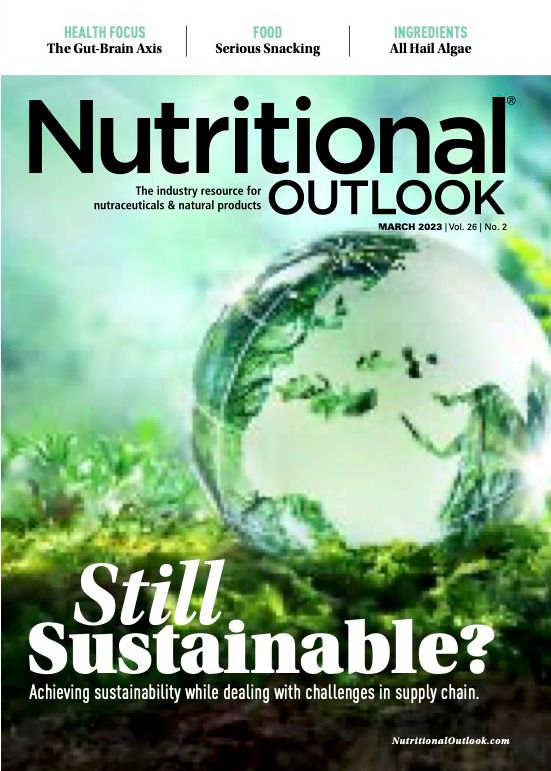The more you grow: Consumers embrace botanicals
Botanical and herbal supplement sales go from strength to strength.
© Amenic181 / Stock.adobe.com

You needn’t turn back the clock very far to recall a time when the alpha and omega of nutritional supplementation ran more or less from vitamins to minerals—period.
The mere idea of including something as exotic as a botanical in a general-purpose multi—to say nothing of touting its adaptogenic appeal or history in Ayurvedic or Traditional Chinese Medicine—seemed fringy at best, and downright countercultural at the extreme.
Fast-forward to now, and, boy, have the tables turned. Americans spent more on herbal supplements in 2021 than they ever had, according to the latest Herb Market Report published in the American Botanical Council’s (ABC; Austin, TX) journal HerbalGram. And in so doing, they elevated the category’s annual domestic take to a whopping $12.35 billion in value.
In fact, notes Tyler Smith, managing editor of HerbalGram and the report’s lead author, “Sales of herbal supplements have largely outpaced those of other dietary-supplement categories for almost a decade, and annual sales of herbal supplements in the United States have increased every year since 2004. This sustained growth is truly remarkable: Products once considered fringe have now fully entered the mainstream.”
Fringe? Make that fired up.
Mainstream Momentum
That’s certainly Holly E. Johnson’s reading of the ABC data. “Nearly three years after COVID-19 first upended our lives,” observes the chief science officer of the American Herbal Products Association (AHPA; Silver Spring, MD), “the data from ABC’s Herb Market Report suggests that increased demand for herbal supplements is here to stay and that botanicals now have a more long-term, if not permanent, place in the health regimens of consumers who may have previously only used vitamins or minerals.”
The reasons why are many. Anne Scott Livingston, senior data analyst, product intelligence R&D, SPINS (Chicago), points to consumers’ familiarity with and acceptance of natural products as a door-opener to the sector and notes that industry itself has “worked for years to increase that awareness and access.”
Distribution in emerging channels has also expanded access. According to HerbalGram’s Smith, direct-to-consumer sales, including online sales from some retailers, have been trending higher than sales tracked by Nutrition Business Journal in two brick-and-mortar channels (mass-market and natural/health-food/specialty) since at least 2005. “This essentially follows the rise of ecommerce,” he notes, adding that 2021 direct-to-consumer retail sales accounted for both the strongest growth and the highest overall take of these three market channels, “and by a wide margin.”
Accompanying botanicals’ expansion across channels has been a diversification in product formats, with everything from pills and oils to creams, tinctures, bath salts, and more now on offer. And for Livingston, that’s all to the good: “Having a wide range of products makes those products more accessible to more consumers,” she declares.
Going Viral
Of course, none of this growth would have ground to stand on were it not for “the ongoing, high-quality clinical research on medicinal plants,” Smith emphasizes, which he believes has buttressed consumers’ trust in herbal supplements.
But let’s be candid: The pandemic deserves a lot of credit for shooting botanicals into the stratosphere.
As Smith recounts, “Sometimes it’s a challenge to discern consumer trends when looking at annual sales data for herbal supplements, but the pandemic brought everything into focus.”
Especially during the uncertainty and fear of COVID-19’s first year, he continues, “Consumers appeared to embrace herbal options to help support the immune system. And in 2021, even with vaccines widely available and life slowly returning to normal, consumers continued seeking out herbs marketed for immune support.”
Livingston observed the same trend and notes that especially in early-COVID, “Immune-boosting ingredients like elderberry and camu camu gained popularity along with ingredients geared toward stress relief, such as chamomile and lavender.”
Though some of these herbs suffered slight sales declines in 2021, overall traffic in immune-support herbs remained “significantly higher than pre-pandemic levels,” Smith maintains, “with some industry experts calling immune-support supplements ‘the new multivitamins.’”
Immunity, Boosted
Like multivitamins, botanical immune-support products are adopting increasingly sophisticated formulations.
In particular, Smith says, “Combination herbal products with added immune benefits—so-called ‘immune-plus’ formulas—were especially popular during the pandemic’s second year.”
But the “-plus” phenomenon isn’t unique to the pandemic, as sales of multi-herb products outpaced those of their single-herb counterparts not just in 2021, Smith says, but in every year since 2011. “Although single-herb products still represent a slight majority of overall sales,” he wagers, “I think combination formulas tend to have broader appeal, and savvy consumers increasingly recognize that different botanicals can work synergistically or additively to help support a particular health function.”
Hence the appeal of those aforementioned “immune-plus” formulas. In fact, one of the trend predictions that Chicago-based natural-industry insights specialist Kimberly Kawa floated going into 2023 holds that supplements sporting dual primary health focuses will continue to shine. “And one note in the Herb Market Report that stood out to me was the pairing of botanicals with other synergistic ingredients to unlock multiple primary health benefits,” she says.
“So even though elderberry isn’t reporting overall gains within the wider supplement universe,” Kawa continues, “there’s a niche pocket of growth in the sleep-support-plus-immunity set. And with pill fatigue another phenomenon mentioned in the Herb Market Report, it’s notable that many of the successful elderberry products in this sleep-plus-immune set are chewable.”
Mind Equals Body
Immunity wasn’t botanicals’ only game in town, of course. “Consumers also gravitated toward herbal products for digestive, energy, and mood support in 2021,” Smith says, “and that also appeared to be in response to pandemic-related lifestyle changes.”
No surprise. Referencing the Herb Market Report, Kawa notes that keywords consumers used to describe their pandemic state of mind were “prolonged stress,” “languishing,” “stagnation,” “emptiness,” and—not coincidentally—“the need for supplements that support both anxiety plus sleep.”
Thus, demand for ashwagandha—“by far the most sought-after ingredient in the mood-support supplement set,” Kawa says—remains robust. Its high profile and appearance in snack and functional-beverage formulas aid its success, she believes, and she’s even noticed it teamed with magnesium in a dual-focus formulation addressing mind-body relaxation.
“Other than ashwagandha,” she continues, “the main ‘cortisol-reducing’ herb reporting sales gains in brick-and-mortar in the past 52 weeks ending December 4, 2022, is eleuthero, or Siberian ginseng. And even though we see declines for chamomile and rhodiola in supplements, we see dollar growth of these cortisol-reducing herbs in the shelf-stable-tea space.”
Odds and Ends
Closely allied with mood support are concerns around memory and cognitive function, notes Livingston, and emerging ingredients angled in this direction, like gotu kola, “have begun to take off.”
“In addition to cognitive function,” Livingston continues, “gut health has remained a key theme for consumers, and sales of ginger continue to rise.” Even botanical newbies are familiar with it, she says, “So those looking to promote healthy digestion are likely to seek it out.”
And botanicals with a tie to women’s health—“especially hormone regulation and fertility promotion”—also strike Livingston as primed for popularity. “Women’s health has been a key theme in botanical sales,” she says, “and maca, which many take to regulate and balance hormones, had continued strong growth in 2022 as women sought natural products to promote fertility and overall well-being.”
She mentions shatavari as another up-and-comer for women’s hormonal balance and fertility. An Ayurvedic staple, “It quickly gained popularity as an emerging herb in this space with notable growth in 2022 dollar sales,” she says.
Moving on from women’s wellness, Stefan Gafner, ABC’s chief scientific officer, considers algae-derived ingredients “products to watch,” and bets that growth in both adaptogens and mushroom supplements will continue.
“I’m actually a bit surprised that andrographis hasn’t seen stronger growth,” he notes, “as a number of good studies support its benefits for the immune system.” But given some settling of the pandemic’s immunity bounce, “It wasn’t too much of a surprise to see sales of botanicals in this category drop a bit,” he figures.
Obstacles and Opportunities
Either way, Gafner is bullish on botanicals’ future—though he’s also clear-eyed as to the sector’s challenges.
Sustainability, sourcing, supply chains, science: “You named some of the main issues,” he says. “Being able to provide high-quality ingredients to an ever-growing population in a way that treats the environment, growers, and harvesters respectfully is certainly one of my main concerns. So while I’m happy that affordability allows botanical supplements wider use, the race to the bottom with regards to pricing has yielded shortcuts in quality from some suppliers and manufacturers that we need to address.”
He’s especially uncomfortable to see the sale of products containing very little of named botanical but a whole lot of excipients. “I’m also concerned about manufacturers’ tendency to produce more multi-ingredient formulas,” he notes. “Many are great, but some contain ingredients at such low levels that there just doesn’t seem any reasonable explanation as to how the products could provide the expected benefits.”
But the bright side shines its own spotlight. “More clinical studies are published each year on both botanical ingredients and finished products,” Gafner points out. “I also believe that botanical supplements generally have a really good safety record, which makes them appealing to consumers.”
And sector companies are actively working to improve ingredient quality by publishing their own studies on method development, he says, “participating in validation studies or supporting initiatives like the ABC-AHP-NCNPR Botanical Adulterants Prevention Program. I believe this goes a long way toward increasing trust in these products and their benefits.”
Future HerbalGram Herb Market Reports will reflect the dividends these programs pay. And while some industry sources have hinted at dampened sales growth for 2022, Smith remains undaunted. “The fact that we’re talking about any sales growth during a year with record inflation and steep interest-rate hikes speaks to herbal supplements’ resilience as a category,” he concludes.



















